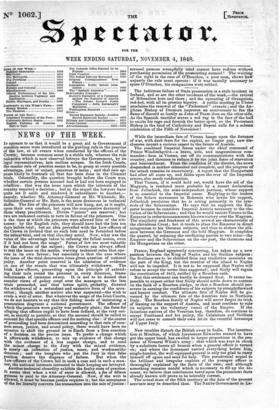;- NEWS OF THE WEEK.
Fr appears to us that it would be a great aid to Government if common sense were introduced as the guiding rule in the practice of the law, at all events when conducted by the officers of the Crown; because common sense is a stable rule whereas the rule unknown which is now observed betrays the rule, by its legal representatives, into endless scrapes. In the Irish Courts, the master rule of practice seems to be, to grasp at every possible advantage, just or unjust, generous or mean ; and that rule ap- pears likely to frustrate all that has been done in the Clonmel trials. Ostensibly, the question brought before the Court was, whether certain persons accused had or had not been engaged in rebellion: that was the issue upon which the interests Of the country required a decision ; but in the sequel the lawyers have quite set it aside and rendered it subordinate to another,— namely, whether Mr. Attorney-General or Mr. Whiteside, Mr. Solicitor-General or Mr. Butt, is the more dexterous in technical shifts. The fate of the prisoners will now hang, not, as it ought, upon their own conduct, but upon the comparative dexterity of those sharp practitioners. Divers " points ' are reserved ; but two are reckoned certain to turn in favour of the prisoners. One is the time at which the prisoners were allowed lists of the wit- nesses: by the English rule, they should have had the lists ten days before trial ; but an idea prevailed with the Law-officers of the Crown in Ireland that no such lists need be furnished before the actualtrial, and on that idea they acted. Now, what was the value of the advantage taken in refusing the fullest notice, even if it had not been the usage? Forms of law are most valuable for the defence of the subject ; the Crown can always afford to rest the issue on the merits, waiving technical rules that ope- rate in its own favour; but especially is that the case where the issue of the trial determines some great question of national polity. Another point reserved is the admission of evidence on one of the counts that was ultimately withdrawn. The Irish Law-officers, proceeding upon the principle of extend- ing their toils round the prisoner in every direction, frame indictments of immense sweep. It is not to be denied that sounder views of policy crept over the managers as the late trials proceeded, and that better spirit, probably, dictated the withdrawal of a redundant and excessive form of the accu- sation; though another motive also was suspected—the wish to evade a writ of error. But whatever the usage of the Irish Courts, we do not hesitate to say that this fishing mode of instituting a prosecution disgraces a national government. The offence of which the prisone'rs were guilty was perfectly plain; the form for alleging that offence ought to have been defined, at the very out- set, as strictly as possible, so that the accused should be called to account for that specific ofence and for nothing else : if the course of proceeding had been determined according to that rule of com- mon sense, justice, and sound policy, there would have been no eccasion to shift the ground or to flinch from a firm exaction of a decision on the precise issue. To prefer a charge which is afterwards withdrawn, to mix up evidence of that charge with the evidence of a less cogent charge, and to send the minor charge to the Jury with the mixed evidence, is surely an infraction of justice, sense, and workmanlike decorum ; and the bunglers who put the Jury in that false position deserve the disgrace of failure. But when the Law-officers of the Crown fail in such a case and in such a man- ner, the national interests intrusted to their keeping are betrayed. Another technical absurdity exhibits the faulty state of practice. It seems that when a writ of error is allowed, a fee of fifteen guineas is paid to the Attorney-General. Now, if the writ is allowed, it must be because justice requires it; but the acceptance of the fee literally converts the transaction into the sale of justice :
accused persons wrongfully tried cannot have redress without purchasing permission of the prosecuting counsel ! The waiving of the right in the case of O'Donohoe, a poor man, shows how unjustly the rule must operate : if it was morally necessary to spare O'Donohoe, his companions were robbed.
The ludicrous failure of State prosecution is a stale incident in Ireland, and so are the other incidents of the week,—the revival of Ribandism here and there ; and the uprearing of Orangeism, red-hot, with all its pristine bigotry. A public meeting in Ulster proclaims the renewal of the "Protestant" crusade ; and the An- glican Bishop of Dromore improves an anniversary to fan the flame of discord as lustily as John of Tuam does on the other side. As the Spanish tauridor waves a red rag in the face of the bull to excite his rage and furnish the better sport, so the Protestant Bishop in the land of Catholicity and Repeal calls for a solemn celebration of the Fifth of November
























